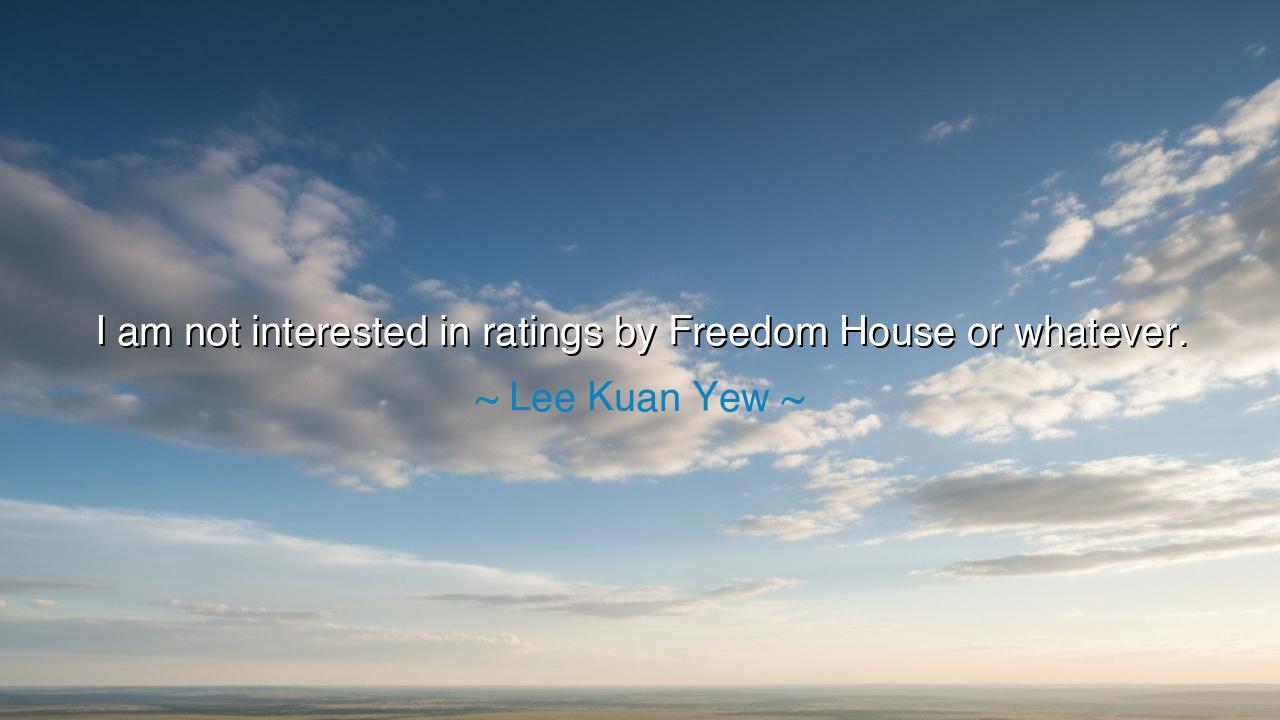
I am not interested in ratings by Freedom House or whatever.






Opening Scene – Narrated by Host
The room was quiet, the light of the late afternoon casting a calm glow over the space. Jack sat at his desk, reading through a quote that had left him reflecting on leadership and personal values. It was from Lee Kuan Yew, a man who played a significant role in shaping Singapore's modern success. The quote stood out because it expressed his indifference to external measures of success, focusing instead on the principles that guided his leadership.
Jeeny entered the room, noticing Jack’s reflective demeanor. She took a seat across from him, sensing he was deep in thought.
Jeeny: “You look like you're thinking about something important. What’s on your mind?”
Jack looked up, still pondering the quote, and shared it with her.
Jack: “I was thinking about something Lee Kuan Yew said: ‘I am not interested in ratings by Freedom House or whatever.’ It struck me because it reflects his belief that true leadership isn’t about seeking validation from external sources. It's about focusing on what’s right for the country, for the people, and for the long-term vision—regardless of how others rate or measure success.”
Jeeny paused, taking in the depth of the statement.
Jeeny: “That’s such a bold perspective. In a world where so much emphasis is placed on rankings, ratings, and external validation, it’s refreshing to hear someone say that those measures don’t define what’s truly important. For Lee Kuan Yew, it wasn’t about how he was perceived by others—it was about staying true to his values and ensuring his decisions were in the best interest of the country, even if they weren’t always popular or in line with what others thought was ‘right.’”
Jack: “Exactly. What’s interesting is that by rejecting these external validations, he was able to focus on the bigger picture—on his country’s long-term growth and stability, even if it meant making tough, unpopular decisions. His focus was always on Singapore’s development, and he didn’t let outside opinions or ratings shape his approach.”
Host: Their conversation deepened as Jack and Jeeny reflected on Lee Kuan Yew’s philosophy. The quote wasn’t just about rejecting external validation—it was about leadership grounded in purpose and vision. Lee Kuan Yew had a clear understanding of his goals for Singapore and wasn’t swayed by the opinions of others or by superficial measures of success.
Jeeny: “It also makes me think about how easy it is to get caught up in seeking approval from others. We live in a world where ratings, reviews, and external measurements seem to define success. But Lee Kuan Yew’s words remind us that these external factors don’t necessarily reflect the true value or impact of our actions. What really matters is the integrity of our choices and whether they align with our long-term vision.”
Jack: “Right. And it’s not just about rejecting external validation for the sake of rejecting it—it’s about understanding that those metrics don’t always capture the whole picture. Leadership, whether in government or business, is about staying focused on what truly matters, and sometimes that means staying true to your values and vision, even if others don’t understand or approve.”
Jeeny: “And it also speaks to the idea of being authentic in leadership. Lee Kuan Yew wasn’t trying to appease others or conform to outside expectations. He was making decisions that he believed were best for Singapore, regardless of how they were perceived by external organizations or foreign critics.”
Host: Jack smiled, feeling the weight of their conversation settling in. Lee Kuan Yew’s words weren’t just about rejecting ratings or external validation—they were a reminder that true leadership is about vision, integrity, and staying focused on the long-term goals. It’s not about fitting into a mold or seeking approval; it’s about doing what’s right, even if it means going against the grain.
Jack: “So, maybe the lesson here is that real leadership isn’t about external approval or meeting someone else’s standards. It’s about staying true to your values and your vision, regardless of how others perceive it. It’s about making decisions that align with what’s best for the greater good, not just what’s popular or rated highly by others.”
Jeeny: “Exactly. When we let go of the need for external validation, we can focus on making decisions that matter, that have long-term impact. Leadership is about authenticity, integrity, and the courage to do what’s right, even when it’s not easy.”
Climax and Reconciliation
The room felt quieter now, as Jack and Jeeny reflected on the deeper meaning behind Lee Kuan Yew’s words. Outside, the world continued its steady rhythm, but inside, they had uncovered something profound: true leadership is not about external recognition or validation. It’s about authenticity, staying true to your vision, and making decisions that align with your values.
Jack: “So, maybe the key is to focus less on what others think and more on what we know is right. Leadership isn’t about winning approval—it’s about staying true to the long-term goals and values that guide us.”
Jeeny: “Exactly. When we trust our vision and remain committed to what matters most, that’s where real impact comes from.”
Host: The conversation settled into a quiet understanding. Leadership grounded in integrity and vision isn’t swayed by external opinions or ratings. It’s about staying focused on what truly matters, making decisions with authenticity and purpose, and leading with a long-term perspective.






AAdministratorAdministrator
Welcome, honored guests. Please leave a comment, we will respond soon